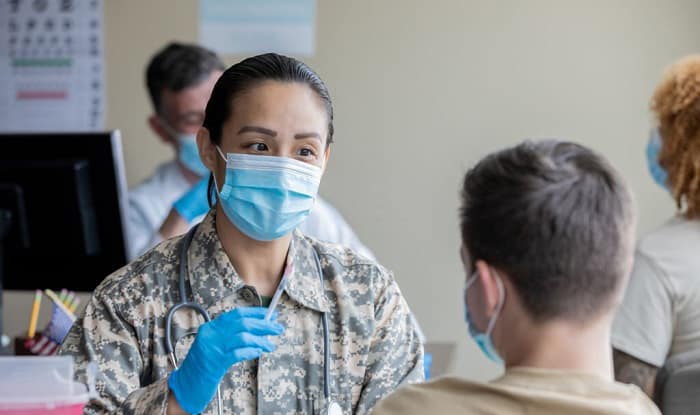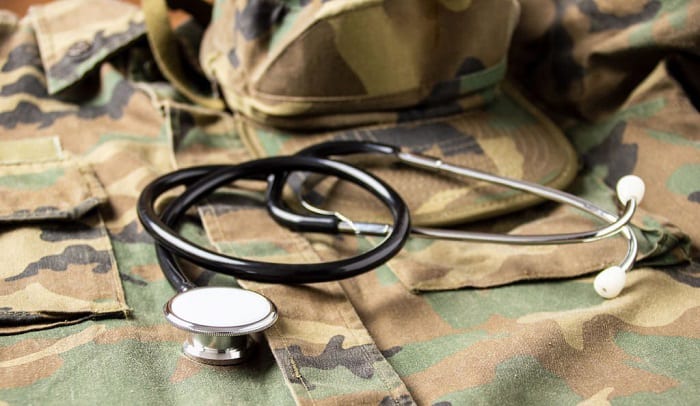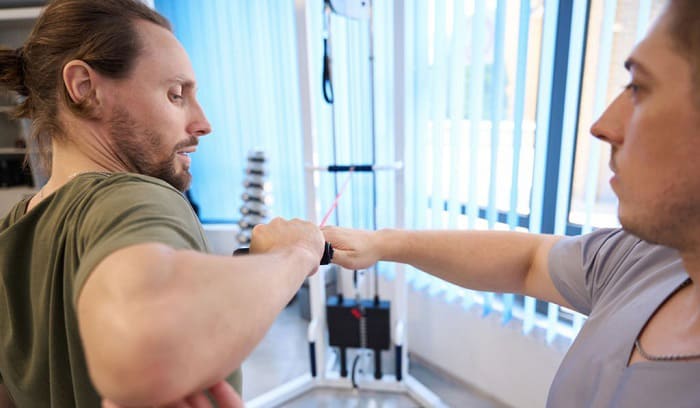
The military needs doctors as much as it needs soldiers. So, it is not a bad idea to work toward becoming a military doctor. Today’s article on how to become a military doctor will provide the essentials for you to create your own career map.
Read through and take notes of the military doctor requirements and military doctor programs, among other information!
Table of Contents
How to Become a Doctor for the Military

What You Will Need to Prepare
You will need to invest time and effort into this process. So, prepare yourself physically and mentally. It is a lengthy process that will ask for your due diligence.
Step 1: Earn a Bachelor’s Degree
Aspiring military doctors need to start with a Bachelor’s degree. You can take biology, chemistry, or other similar field courses. Once you have a degree, you can enter medical school.
During this step, it is also highly recommended that you acquire work experience or additional degrees to strengthen your candidacy. Participating in volunteer work is a great way to gain experience as well. It is possible to volunteer at organizations or medical centers.
Step 2: Earn a Medical Degree
To get a medical degree, you can either enter the Health Professions Scholarship Program (HPSP) or the Uniformed Services University of Health Sciences (USUHS).
Health Professions Scholarship Program (HPSP)
If you enter the Health Professions Scholarship Program (HPSP), you can go to any medical school you choose and not worry about tuition fees. The program covers the fees and gives you a monthly stipend for other expenses. Currently, the latter is capped at $2,000.
But, in exchange, you will have to commit to service after the program. Your service commitment will be about the same length as the time you spent studying in the program. For example, if you were an HPSP beneficiary for four years, you would be expected to serve for four years. The good thing is that you will still be earning as an officer during this payback period.
You will go through basic military training in your second year of HPSP. Then, in your third and fourth years, you will have the opportunity to be on active duty and serve in local military hospitals.
However, HPSP students are not entitled to general military practice exposure. There will be no field exercises or drills to immerse in military culture.
As an example, here are details of the HPSP Army:
You can pursue any of the following fields afterward:
- Counseling & Clinical Psychology
- Dental
- Medical (Including Osteopathy)
- Nursing
- Optometry
- Veterinary
You will also be entitled to a $20,000 bonus (sign-on) and an Officer’s pay while on school breaks. Plus, your salary will increase with cost-of-living adjustments, time in service, and promotions.
To qualify, you must:
- Be a U.S citizen
- Be on active-duty status in the Army
- Be qualified as a commissioned officer
- Be accepted or enrolled in an accredited medical school program in the U.S or Puerto Rico
- Be committed to a full-time student status during the length of the medical school program
Uniformed Services University of the Health Sciences (USUHS)
USUHS is a military medical school where students are entitled to free tuition and textbooks. If you are a student at USUHS, you will be commissioned as an active O-1 officer. Hence, you will receive an annual income and it will be around $5,000.
When you graduate, you will be promoted to the O-3 officer rank. As a result, your annual salary will be higher and you will enjoy several benefits.
However, unlike HPSP students, you will not be able to choose the medical school you go to. You will have to study in Bethesda, Maryland. You might also be required to “pay back” in service for a longer period of time than HPSP students.
Step 3: Join the Military Service
After completing medical school, your military service begins. Military medical doctors must be between 21 and 64 years old. You will have to commit to at least two years of active duty service and satisfy a list of requirements:
- Your minimum GPA needs to be 3.0
- Your minimum MCAT score needs to be 500
You will stand out if you have done volunteer work and have been in leadership roles.
- Pass the physical exam
- HPSP applicants will take this exam at the MEPS (Military Entrance Processing Station)
- USUHS applicants will take it through the Department of Defense Medical Examination Review Board
- Pass security investigations
Once you pass and enlist, you will sign a contract to dedicate to service. There will be a commitment of a certain minimum number of years in service.
Step 4: Wait For Military Residency Matching
After signing the contract to enter service, you will be matched to a military residency. This is where you will work, though the specific setting is a military healthcare facility.
Note that even if you were able to pick a specialty as a military medical student, you would not necessarily get the residency you want. This is particularly true if the residency you desire is competitive.
- Note: If you are not selected, you can apply again after completing a post-graduate year and serving as a general medical officer.
Frequently Asked Questions (FAQs)

What do military doctors do?
Military doctors provide medical care for military members and their families. In some cases, they might be expected to provide the same care for civilians. For instance, if they were deployed for humanitarian relief missions. Just like civilian doctors, military doctors’ daily tasks can include diagnosing illnesses, treating patients, and prescribing medicine
Where do military doctors work?
Military doctors can work on military bases, aboard ships at sea, aboard aircraft carriers, or at hospitals/ medical care centers like the Walter Reed Military Medical Center.
How are military doctors paid?
Military doctors are officers, so their pay is based on their rank and pay grade. The minimum a doctor in the military can make is $3,107.70 per month, as this is the lowest officer pay grade.
Besides the standard pay grade, military doctors can also earn special pay or bonuses. There are a number of these, and they vary depending on the specific medical role. For example, a military doctor with at least a year of service is entitled to a Variable Special Pay of up to $12,000 a year. Other incentives can be influenced by the branch a doctor is in and the nature of an assignment, like whether it is overseas or hazardous.
What benefits are military doctors entitled to?
Military doctors with at least 20 years of service under their belt can receive a monthly pension based on their base pay or a discounted lump sum. Plus, they can receive up to $400,000 in life insurance. Healthcare and dental coverage and malpractice insurance are also provided for military doctors to avail of while on active duty.
How many years does it take to become a military doctor?
Earning a Bachelor’s degree typically takes four years. And a medical degree takes another four years. So, it can take at least 8 years to get the fundamental educational requirements to become a military doctor. For strong candidacy, aspiring military doctors may have to invest more time into volunteer work; hence, it can take over 8 years to be a doctor in the military.
Do military doctors only care for military members?
Military doctors and military physicians typically provide medical care to service members, but they also care for military members’ families and civilians, depending on their deployment and mission.
Are military doctors deployed? If yes, how often?
Military doctors can be deployed. Unfortunately, there is no standard for how often a military doctor can be deployed. This depends on many factors, such as the doctor’s specialty and the needs of the country. It is important to know that you can be deployed to active combat zones and hazardous areas as a doctor. Most deployments last for three to 12 months.
Do military doctors get rotated?
Yes. Rotations usually happen right after medical school. They are an opportunity for military doctors to practice what they have just learned in various settings. This helps students gain experience and decide on their specialties as well.
Is it possible to become a specialist in the military?
Definitely. You can become a military surgeon, for example. The options for specialization vary from one branch to another. Here is the general list for the Army and Air Force:
Medical Specializations in the Army (Army Doctors’ Specializations)
- Allergist
- Anesthesiologist
- Audiologist
- Cardiologist
- Cardiovascular Specialist
- Clinical Pharmacologist
- Clinical Psychologist
- Combat Medic Specialist
- Dental Specialist
- Dermatologist
- Dietitian
- Emergency Physician
- Endocrinologist
- Endodontist
- Entomologist
- Eye Specialist
- Family Medicine Physician
- Field Surgeon
- Flight Surgeon
- Gastroenterologist
- General Surgeon
- Internal Medicine Physician
- Medical Oncologist
- Neurologist
- Neurosurgeon
- Nutrition Care Specialist
- Obstetrician
- Occupational Medicine Officer
- Occupational Therapist
- Operating Room Specialist
- Ophthalmologist
- Optometrist
- Oral and Maxillofacial Surgeon
- Oral Pathologist
- Orthodontist
- Pathologist
- Pediatric Dentists
- Pediatric Physician
- Periodontist
- Physiatrist
- Physical Therapist
- Podiatrist
- Preventative Medicine Specialist
- Prosthodontist
- Psychiatrist
- Public Health Dentist
- Respiratory Specialist
- Rheumatologist
- Urologist
Medical Specializations in the Air Force (Air Force Doctors’ Specializations)
- Aerospace Medicine Specialist
- Anesthesiologist
- Clinical Geneticist
- Critical Care Medicine Specialist
- Dermatologist
- Diagnostic Radiologist
- Emergency Services Physician
- Family Physician
- Neurologist
- Nuclear Medicine Physician
- Ophthalmologist
- Obstetrician
- Orthopedic Surgeon
- Otorhinolaryngologist
- Pathologist
- Pediatrician
- Psychiatrist
- Surgeon
- Urologist
Conclusion
It is certainly not easy to become a military doctor. The path to this career can be long and tiring, but it is worthwhile.
Hopefully, with the information we have provided in this article on how to become a military doctor, you can prepare for your own path. The fundamentals include a Bachelor’s degree and a medical degree. You also should not forget the enlistment requirements, such as the physical exam and security clearances. It is important that you wisely invest your time and effort.
We wish you all the best in your path toward becoming a military doctor.
If you are already in the process, leave a comment to let us know where you are at!

I am Everett Bledsoe, taking on the responsibility of content producer for The Soldiers Project. My purpose in this project is to give honest reviews on the gear utilized and tested over time. Of course, you cannot go wrong when checking out our package of information and guide, too, as they come from reliable sources and years of experience.
